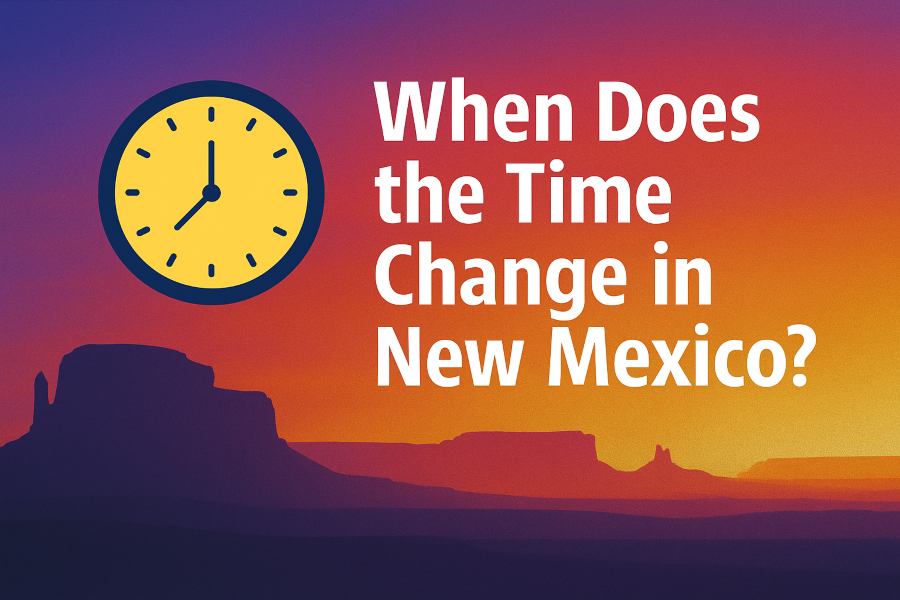If you're asking, “When does the time change in New Mexico?” you're likely planning your schedule, coordinating with others, or simply curious about how the Land of Enchantment handles Daylight Saving Time (DST). Knowing when to spring forward and fall back is essential for residents and travelers alike to avoid confusion and stay on time.
Last updated: June 17, 2025Next Time Change in New Mexico:
New Mexico will "Fall Back" (turn clocks back one hour) from Mountain Daylight Time (MDT) to Mountain Standard Time (MST) on:
Sunday, November 2, 2025, at 2:00 AM MDT.
This means at 2:00 AM MDT, clocks will turn back to 1:00 AM MST.
Does New Mexico Observe Daylight Saving Time?
Yes, New Mexico does observe Daylight Saving Time (DST). The state follows the federal guidelines established by the Uniform Time Act of 1966 and its subsequent amendments. This means that, like most of the United States, New Mexico adjusts its clocks twice a year to make better use of natural daylight.
New Mexico is located entirely within the Mountain Time Zone (MT). During the standard time period (roughly from November to March), it observes Mountain Standard Time (MST), which is UTC-7 (Coordinated Universal Time minus 7 hours). When Daylight Saving Time is in effect (roughly from March to November), New Mexico switches to Mountain Daylight Time (MDT), which is UTC-6 (Coordinated Universal Time minus 6 hours).
When Does the Time Change in New Mexico? Official DST Dates
Daylight Saving Time in New Mexico, as in the rest of the United States where it is observed, begins on the second Sunday in March and ends on the first Sunday in November. On these dates, clocks are adjusted as follows:
- Spring Forward: On the second Sunday in March, at 2:00 AM local standard time, clocks are advanced one hour to 3:00 AM local daylight time. This means an hour of sleep is "lost."
- Fall Back: On the first Sunday in November, at 2:00 AM local daylight time, clocks are turned back one hour to 1:00 AM local standard time. This means an hour of sleep is "gained."
Here are the specific dates for the time changes in New Mexico for the current and upcoming years:
| Year | Daylight Saving Time Begins (Spring Forward at 2 AM) |
Daylight Saving Time Ends (Fall Back at 2 AM) |
|---|---|---|
| 2024 | Sunday, March 10 | Sunday, November 3 |
| 2025 | Sunday, March 9 | Sunday, November 2 |
| 2026 | Sunday, March 8 | Sunday, November 1 |
| 2027 | Sunday, March 14 | Sunday, November 7 |
Marking these dates on your calendar can help you prepare for the shifts and minimize any disruption to your routine.
How Time Change Affects Residents and Travelers in New Mexico
The twice-yearly time change in New Mexico has several impacts on the daily lives of its residents and those visiting the state: Daily Schedules, School and Work, Business Hours, Appointments and Travel, Outdoor Activities, and Comparison with Arizona (most of which does not observe DST, creating a time difference with NM during MDT).
How to Automatically Adjust for Time Change: Devices and Clocks
In today's digital age, adjusting for the time change is largely an automated process for many of our devices: Smartphones and Computers, Cable Boxes and Streaming Devices often update automatically if set to use network time. However, Car Clocks, Analog Clocks and Watches, and many Appliances will require manual adjustment.
Tips for Preparing for the Time Change
While the time change is only an hour, it can still disrupt our internal clocks. Tips include: Adjust Sleep Gradually before "spring forward", Maintain a Consistent Sleep Schedule, Maximize Daylight Exposure (especially morning light), Create a Relaxing Bedtime Routine, Watch Caffeine and Alcohol Intake, Set Reminders for manual clocks, and use the occasion to Check Smoke Detector Batteries.
Is New Mexico Planning to Abolish Daylight Saving Time?
The debate over whether to continue observing Daylight Saving Time is ongoing across the United States, and New Mexico is no exception. Periodically, state legislators have introduced bills and proposals. As of mid-2025, New Mexico continues to observe Daylight Saving Time according to federal law. Residents interested in this topic should follow news from the New Mexico Legislature during its sessions to stay updated on any new proposals or changes in status.
Frequently Asked Questions (FAQ)
Conclusion: Staying on Time in the Land of Enchantment
For residents and visitors in New Mexico, understanding the Daylight Saving Time schedule is key to navigating daily life smoothly. Remember that the state "springs forward" to Mountain Daylight Time (MDT) on the second Sunday in March and "falls back" to Mountain Standard Time (MST) on the first Sunday in November.
While most digital devices will update automatically, it's wise to be aware of these dates, manually adjust other clocks, and perhaps take a few steps to help your body adapt to the one-hour shift. As discussions about the future of DST continue nationally and at the state level, New Mexicans will, for the foreseeable future, continue this biannual ritual.
For precise, real-time information about current times and time zone conversions, especially when coordinating across different regions, resources like WhatTimeIsItIn.io can be invaluable. Stay informed, stay on time, and enjoy all that New Mexico has to offer, regardless of what the clock says!
